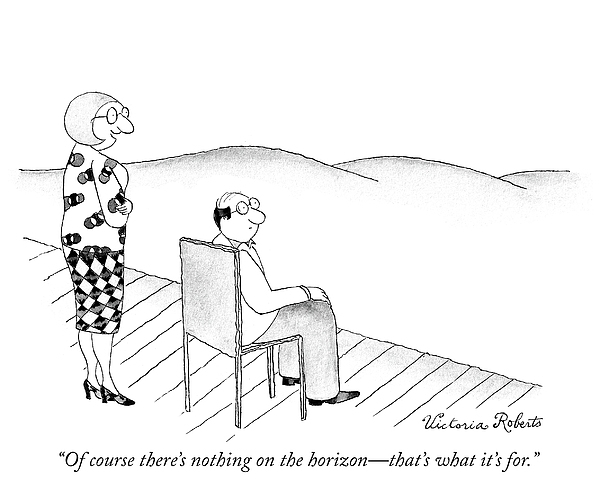Word of the Day: "úht-cearu"––the worries that gather as one lies sleepless before dawn (Old English; lit. "early-morning care").— Robert Macfarlane (@RobGMacfarlane) March 31, 2020
A feeling bleakly recognisable across centuries; a word that echoes in our current moment.
Cf Swedish "vargtimmen"/"wolf-time".
(Pron. "oot-chair-oo") pic.twitter.com/3TtO5KktMn
Another good reason to get up at dawn.
Today at Pandemic U., it's Montaigne, Descartes (on his birthday), and Pascal in CoPhi, and Spiritual Freedom in A&P.
My short shtick: Descartes craved certainty, Montaigne repudiated it, and Pascal -- though a brilliant mind and marvelous writer of thoughts ("pensees") -- was a bad gambler. The challenge of faith is not a coin-flip, the question of our origins and destiny doesn't come down to a simple either/or between Christianity and Atheism.
I side for once with Charles Sanders Peirce, who said contrived doubts like Descartes's of his own existence are not a proper starting-place in philosophy. And while Pascal's statement that our problems are largely due to our inability to sit alone in a room has real resonance at this moment, I can't relate to his fright at the silent immensity of the night sky. "The eternal silence of these infinite spaces frightens me.” Really? It intrigues me, and fills me with wondrous curiosity. It elicits my support of SETI.
Montaigne remains for me the most compelling of that trio, I love that he fell off his horse and thus lost his fear of death. I love that he was a peripatetic. "My mind will not budge unless my legs move it." I love his fascinated fixation on life's little details. And I love that he invented the personal essay as we know it. In a way he was, as Sarah Bakewell has noticed, the first blogger.
In A&P it's "Natural and Spiritual Freedom" (LISTEN). Spiritual freedom, unlike its natural counterpart which we share with the rest of the animal kingdom, requires (says Martin Hagglund) "the ability to call into question, challenge, and transform our ends" -- in other words, it requires philosophy, our primary tool of spiritual "self-maintenance."
 Speaking of the other animals, Hagglund's discussion of natural and spiritual faith & freedom reminds me of Walt Whitman's encomium to our less internally-conflicted cousins.
Speaking of the other animals, Hagglund's discussion of natural and spiritual faith & freedom reminds me of Walt Whitman's encomium to our less internally-conflicted cousins.
I think I could turn and live with animals, they are so placid and self-contain'd,
I stand and look at them long and long. They do not sweat and whine about their condition,
They do not lie awake in the dark and weep for their sins,
They do not make me sick discussing their duty to God,
Not one is dissatisfied, not one is demented with the mania of owning things,
Not one kneels to another, nor to his kind that lived thousands of years ago,
Not one is respectable or unhappy over the whole earth... Song of Myself
I'm reminded as well of George Santayana's "animal faith," which poses a nice counterpoint to both Cartesian methodological skepticism and Cartesian indubitability. "Without this faith there could be no rational approach to the necessary problem of understanding and surviving in this world." g'r Someone should work out the connections between Hagglund's and Santayana's versions of qualified faith. Both strike me as varieties of natural and humanistic freedom I can believe (or have spiritual/animal faith) in.
I stand and look at them long and long. They do not sweat and whine about their condition,
They do not lie awake in the dark and weep for their sins,
They do not make me sick discussing their duty to God,
Not one is dissatisfied, not one is demented with the mania of owning things,
Not one kneels to another, nor to his kind that lived thousands of years ago,
Not one is respectable or unhappy over the whole earth... Song of Myself
I'm reminded as well of George Santayana's "animal faith," which poses a nice counterpoint to both Cartesian methodological skepticism and Cartesian indubitability. "Without this faith there could be no rational approach to the necessary problem of understanding and surviving in this world." g'r Someone should work out the connections between Hagglund's and Santayana's versions of qualified faith. Both strike me as varieties of natural and humanistic freedom I can believe (or have spiritual/animal faith) in.
The first natural feature of life that our commitment to self-maintenance implies is the inherent finitude of life. We "disintegrate and die" when the project of self-maintenance ends. Data and Picard know that, or will in their 24th century. "A butterfly that lives forever is really not a butterfly at all." It's the butterfly of the finite moment that symbolizes a happy, "blue skies" existence.
Plus, I'm with JL: I don't necessarily want to live "forever," but I'd take an extra (healthy) decade or two. "Engage!"
Spoiler warning: Picard gets a material upgrade at the end of his first season, but his body is still as fragile and finite as a healthy 94-year old can ever expect. Hagglund points out, "Even if the material we are made of were improved and made more durable, our bodies would still have to run the risk of breaking down and ending our lives." That's the risk we run as finite beings leading vulnerable lives. If COVID-19 is good for nothing else, it's reminding us of that. To live a human life necessarily requires boldness and fortitude. That's our continuing mission.
Finally, I love the walking metaphors Hagglund has sprinkled through his book. Just as a walker must project a spatial horizon, "anyone who is leading her life must project the temporal horizon of her death." This is serious business, this leading of lives.

"To believe in this living is just a hard way to go." Godspeed (or its secular counterpart), Mr. Prine.


